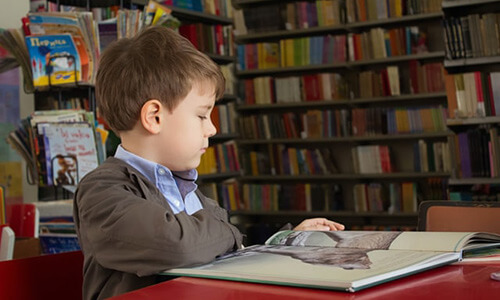“Show me a family of readers, and I will show you the people who move the world”
– Napoleon Bonaparte
Benefits of Reading
It is said that when you want to focus, start reading a book. And when you read a good book, you won’t be able to focus on anything else. That is the power of the printed word. Most parents and teachers know and agree that reading is one of the most important skills a child needs to acquire in order to succeed in school. However, here we are not talking about reading as a skill as much as about reading as a lifelong habit.

There are multiple benefits to be reaped from reading and the younger our children are when we initiate them into reading, the stronger their bond with books will be. If children become positively engaged with books before they start school, it helps establish a meaningful, healthy relationship with reading. If we wait for children to start reading once they are in school, they may equate reading with academic pressure. That is by no means desirable. In fact, children can be introduced to cloth books and sensory books (touch and feel) right from their infancy days. By the time the baby learns to sit up, big board books with bright, colourful pictures and audio books can be handed to the child for manipulating.
Of course, in the earliest stages, children cannot read on their own and need someone to read to them. This is where parents must step in. Reading to your child for even half an hour everyday can be the most fulfilling experience and most important investment you can make. In subsequent blogs we will talk about how to inculcate the reading habit in young children and also share pointers for selecting age-appropriate quality books for them. For now, let us focus on the benefits of reading for young children.
Helps Establish Connect Between the Spoken and Written Word

When we read to children, they understand that there is a connection between the sounds coming out of our mouth and the symbols printed on the page in front of them. They discover that (in most scripts) writing and reading goes from left to right and top to bottom. These are the most fundamental requisites of pre-reading.
Increases Vocabulary and Improves Writing Skills
Reading different kinds of books enriches children’s vocabulary and teaches them about correct sentence structure, grammatical rules and vocabulary without them even realizing it. It not only improves spelling and fluency in the mother tongue and in English but reading aloud can also give a boost to children’s speaking skills by improving their pronunciation and diction.
Increases Attention Span
All of us, including children, these days are glued to screens most of the day. This has an adverse effect on attention span and memory. Reading, on the other hand, helps children focus better for longer periods of time. It not only boosts the attention span but also strengthens memory and recall as children’s brains form connections between what they had previously read and what they are reading now.
Opens up Different Worlds and Possibilities
Reading expands children’s horizons and introduces them to the culture and traditions of far-off lands and different people. This helps them learn about diversity. Books of fantasy stories fertilize children’s minds and help them think of possibilities that they do not see in the physical world around them. Books ignite their sense of wonder and make them inquisitive and curious.
Establishes Connection with Relatable Characters

Books with both imaginary and real characters help children find someone they can relate to. They often live their life through these characters and may even find solutions to their own problems through the stories they read. They also get exposed to different personalities and learn more about themselves through them.
Increases Emotional Intelligence
As children read different genres of books, they receive their first lessons in empathy. They get exposed to different people, societies and countries. They discover that there is a world that exists beyond what they see everyday and there are people who look, dress, sound and eat differently than them. This enables them to accept and respect differences and prepares them better as sensitive global citizens of tomorrow.
Promotes Calmness
Reading is also an effective method to calm the mind and unwind. It brings the focus of the child to the story they are reading or listening to at the moment and helps them take control of their overwhelming emotions.
Builds Comprehension
Reading involves exercising comprehension skills and analytical abilities as children try to decode what they have read and also try to predict what is going to happen next in a story. It strengthens cognition and is an ideal workout for their grey cells. This in turn, helps them in tackling curricular material.
Boosts Bonding Between Children and Parents

Reading to children and reading with them are a great way for families to connect. It stabilizes emotions and the exciting time spent together reading has far reaching benefits for children’s mental health, emotional wellbeing and overall confidence. Research strongly suggests that children who are read to regularly do better at school- not only academically but also socially and emotionally.
Also, do not restrict your child’s exposure only to English books- get them to read vernacular books as well. This will then give them a much wider perspective and greater choice while at the same time developing their linguistic skills.
Now that we all appreciate the multiple far-reaching benefits of reading, in the second part of our blog we will proceed to discuss how to inculcate the reading habit in children.


